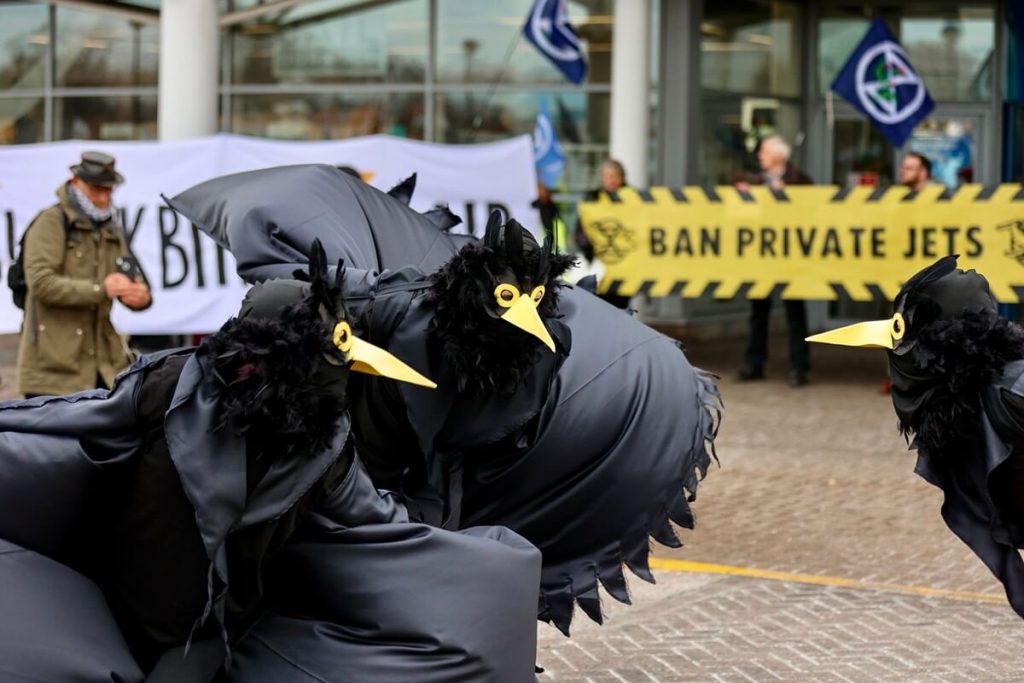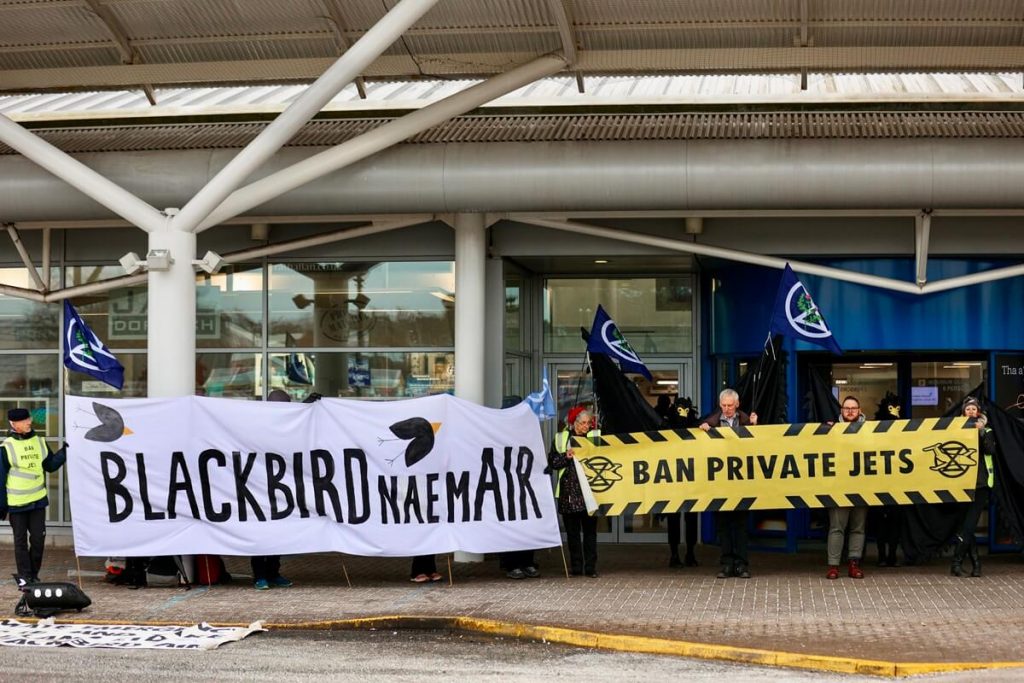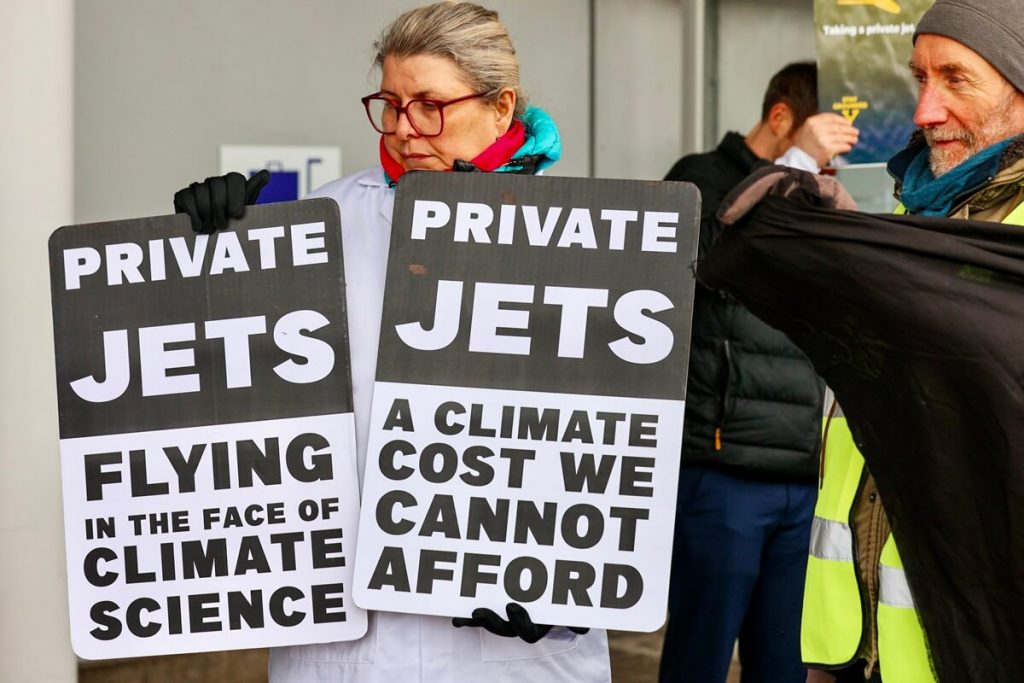Extinction Rebellion Scotland and Scientist Rebellion Denmark protest private jets company, Blackbird
February 16, 2025
Extinction Rebellion Scotland and Scientist Rebellion Denmark protested at Inverness Airport in Scotland and Billund Airport in Denmark. They were highlighting the contradictions between Blackbird Air’s CEO Anders Povlsen private jets enterprise and his Wildland commitment to nature.

Protesters waved banners outside Inverness Airport in Scotland declaring ‘Ban Private Jets’ and ‘Blackbird Nae mAir’ accompanied by others dressed as “blackbirds”. A huge banner was laid on the ground with words from the Wildland Ltd. company website “We’re in a climate emergency. We need to step up and take action”.
Watch Chris Packham’s message to the protest.
The protestors were calling for Anders Povlsen “to step up and take action”, close down Blackbird Air and invest in clean transportation.
The protests were connected by an innovative two-way live link displayed on monitors at both Inverness Airport and at the Blackbird HQ in Billund Airport Denmark.
XR Scotland and SR Denmark call into account the contradictory behaviours of a so-called “eco-billionaire”. One of the largest landowners in Scotland, Povlsen owns Blackbird Air, a luxury private jet business which is set to expand. At the same time Povlsen operates Wildland, a private enterprise which acknowledges the urgent need to act on the climate emergency.

The use of private jets has soared in recent years, with the resulting climate-heating emissions rising by 50%. Passengers in larger private jets caused more CO2 emissions in an hour than the average person did in a year. Aviation fuel remains untaxed while those using a car to get to work pay their taxes at the pumps.
The aviation industry is promoting Sustainable Aviation Fuel (SAF) but the UK SAF mandate only requires that 2% of the UK’s total jet fuel demand be met by SAF in 2025, increasing to 10% in 2030. SAF is always blended with fossil fuels as around 65% of so-called sustainable fuel is kerosene.
However, some airlines and countries are changing. The Danish company, Lego, is closing its private jet division this year. Amsterdam’s Schiphol airport announced a ban on private jets in April 2023. Belgium has introduced new taxes on private jets and France is expected to follow.
Dr Sarah Birkby from Extinction Rebellion Highlands and Islands and Moray said:
‘It is completely contradictory to state the importance of acting on the climate emergency and at the same time run a private jet company. The time when people, no matter how rich, could say one thing and do the exact opposite is over. As Wildland Ltd itself declares, we need people to step up and take action”.
Dr Anthony Graham from Scientists for Extinction Rebellion stated:
“The evidence is clear: our current emissions pathway is incompatible with a safe planet. Every tonne of CO₂ fuels climate change, yet private jets – used by the wealthiest 0.003% – emit disproportionate amounts, worsening both the climate crisis and inequality. Scientists for Extinction Rebellion urge action on luxury emissions, stressing that those with the most power must lead by example.”
Finlay Asher, a spokesperson for Safe Landing, a global community of aviation workers, said:
“At Safe Landing, our aviation community are firmly of the position that there needs to be a rapid reduction in private jets in favour of cleaner and greener forms of travel. And as a Scottish aerospace engineer, I’d love to see Scotland lead the way and pioneer the genuinely sustainable future of flight. Rather than catering to carbon-intensive flying for an elite minority, Inverness Airport could instead become our green gateway for essential island air travel.”
Alex Cochrane from Extinction Rebellion Scotland said:
“Private jets are the quickest way to burn fossil fuels and produce on average 10 times more CO2 emissions per passenger than commercial flights. Though Blackbird Air states on their website ‘Our private jets feature the latest safety innovations and energy-efficient engines’, the aviation industry expects worldwide another 8,500 private jets will enter service by 2033 (including Blackbird), far outstripping any efficiency gains.”
Sign-up for our updates
Keep in touch with our latest news and how you can get involved. We’ll even suggest some great reads and podcasts about activism. You can unsubscribe at any time.

